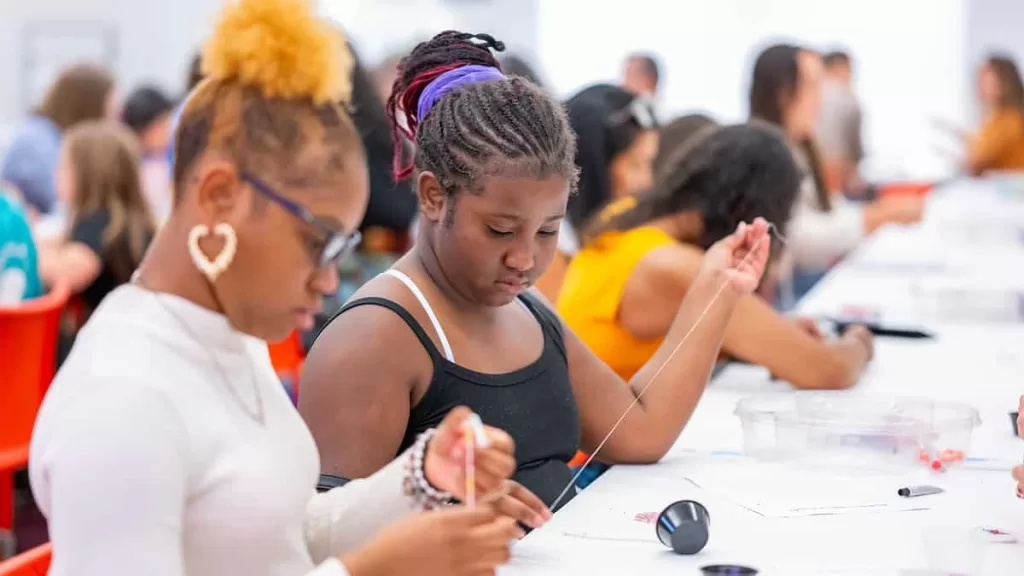MUSEUMS
Guests and families closely look at a work of art in the Black Earth exhibition. This Baltimore Museum of Art family guide ensures that you are adequately prepared for this experience and fun. Photo courtesy of BMA
From mosaics to Matisse, this Baltimore Museum of Art family guide helps parents plan the perfect cultural day out for all ages.
BY KAZEEM ADELEKE, ARTCENTRON
BALTIMORE, MARYLAND —The Baltimore Museum of Art (BMA) stands as one of Maryland’s most respected cultural landmarks. Known for its outstanding collections and inclusive programming, it offers visitors an experience that combines intellectual enrichment with visual inspiration. It is no wonder it is one of the best family-friendly museums in Baltimore. The museum features more than 95,000 works of art, ranging from ancient artifacts to contemporary pieces. Conveniently located in the heart of Baltimore, the BMA welcomes families seeking both education and entertainment. This Baltimore Museum of Art Family Guide ensures that your visit is productive, enjoyable, and memorable for all age groups.
Discovering the Baltimore Museum of Art
A Brief Historical Overview
Established in 1914, the Baltimore Museum of Art has been a vital center for artistic and cultural expression for over a century. From its early days, the museum aimed to provide free access to world-class art, aligning with a mission of inclusivity. Over time, its collection has grown to house the world’s largest assembly of works by Henri Matisse, offering a significant draw for art enthusiasts globally. The BMA has also expanded its holdings to represent various regions, styles, and eras, thus providing a comprehensive view of art history. Its sustained commitment to community engagement and education solidifies its role as a cultural cornerstone.
What Sets the BMA Apart
Through the years, BMA has grown to become one of the best family-friendly museums in Baltimore. It distinguishes itself through its focus on diversity, accessibility, and community-centered programming. Unlike many traditional institutions, the museum encourages active engagement through hands-on experiences and interpretive materials. Visitors will find works from African, Asian, European, and American artists, presented in ways that spark dialogue across generations. The museum actively acquires works from underrepresented artists, ensuring its galleries remain relevant and reflective of today’s global society. This inclusive approach transforms each visit into an opportunity for discovery and personal connection.
Museum Information and Logistics
Location and Operating Hours
The museum is located at 10 Art Museum Drive, Baltimore, MD 21218, adjacent to Johns Hopkins University. Its central location makes it easily accessible for both local and out-of-town visitors. The museum operates Wednesday through Sunday from 10 a.m. to 5 p.m., though these hours may vary on holidays and during special events. This Baltimore Museum of Art Family Guide offers details about what to expect on different days. Visitors are also advised to check the BMA’s website for the latest updates before planning their visit. Clear signage and friendly staff ensure that navigating the museum and its amenities is straightforward and stress-free.
Family Appeal and Child-Friendly Features
A Welcoming Atmosphere for Families
The BMA offers a space where families can explore without feeling confined or unwelcome. Open gallery designs and quiet zones make the environment suitable for children of all ages. Staff members are trained to assist with family needs and are often seen engaging young visitors with thoughtful conversation. The museum recognizes that children learn best through movement and play, and its design reflects that understanding. Whether your children are quiet observers or energetic explorers, the BMA creates space for them to feel at ease.
Educational and Developmental Value
Each exhibit offers numerous educational touchpoints for developing minds. Children can learn about history, culture, and artistic techniques through guided interpretation and visual storytelling. The BMA uses art as a bridge to literacy, cultural understanding, and critical thinking. Parents can supplement their children’s formal education by encouraging observation, questioning, and discussion. Families often leave the museum feeling inspired and more connected, both to each other and to the broader world of art.
Specialized Programs for Children
The museum hosts various interactive programs tailored specifically to younger audiences. These include Family Sundays, drop-in art-making sessions, and special family tours. Led by trained educators, these sessions often align with current exhibitions, making the experience both educational and timely. The programs are free with admission and do not require advanced registration, making them accessible to spontaneous visitors. Additionally, the BMA regularly updates its calendar with seasonal events designed to capture children’s interest during holidays and school breaks.
Getting There and Navigating Your Visit
Driving and Parking
For families choosing to drive, parking is available in a paid lot adjacent to the museum, with additional metered parking along surrounding streets. During weekends and holidays, it is advisable to arrive early to secure a space. Clear directional signage guides visitors from the lot to the main entrance. Parents with strollers or those requiring accessible parking will find the layout accommodating and convenient to navigate.
Public Transit and Rideshare Services
The museum is well connected by public transportation, including the Charm City Circulator and various MTA bus routes. For visitors staying in the city, the Circulator is a free and efficient option. Rideshare services such as Uber and Lyft are also reliable and frequently used by visitors. Bike racks are available for local commuters, and walking paths from Johns Hopkins University make the BMA a natural stop for students and faculty alike.
Admission and Membership Information
Entry Costs and Discounts
General admission to the BMA is always free, which supports its goal of making art accessible to all. Certain special exhibitions may require paid, timed-entry tickets, though discounted rates are often available. The museum also participates in national programs that give free or reduced admission for military families, students, and seniors. These policies help remove barriers and promote a more inclusive visitor experience.
Membership Options for Families
For families who anticipate frequent visits, a BMA family membership provides significant value. Membership includes benefits such as early access to exhibitions, discounts at the gift shop, and invitations to members-only events. Some membership tiers also include exclusive programming for children, offering further enrichment. Membership fees support the museum’s educational mission and help sustain its free admission policy.
Ideal Times for Family Visits
Planning your visit for weekday mornings, especially Tuesday through Thursday, can enhance the experience by reducing wait times and crowding. During the summer and winter breaks, the museum increases its family-friendly programming, including interactive tours and seasonal events. Checking the BMA’s official calendar allows you to align your visit with special programs or temporary exhibits of interest. Avoiding peak weekend hours also ensures a calmer environment for young children.
Pre-Trip Planning Tips
Reviewing Exhibits in Advance
Before visiting, explore the museum’s website to preview current and upcoming exhibits. Some displays may require reservations, especially during peak seasons. The BMA often highlights specific family-friendly galleries and interactive exhibits online. Familiarizing yourself with the museum map can help you chart a path that suits your family’s interests and time constraints.
Packing Essentials
Pack light but smart. Bring a small backpack containing water bottles, hand sanitizer, snacks, and a portable phone charger. Families with younger children may want to bring a foldable stroller. However, large strollers are restricted in certain gallery spaces. Wearing comfortable shoes and dressing in layers will help everyone stay comfortable throughout the visit. Note that the museum does not allow food and beverages inside the galleries, but designated eating areas are available.
Notable Family-Friendly Exhibits
The Cone Collection
This extensive collection includes masterpieces by Matisse, Picasso, Cézanne, and others. Children may be drawn to the vivid colors and expressive forms, even if they are unfamiliar with the artists. This gallery has a visually stimulating environment that encourages questions and dialogue. Educational plaques and QR codes help parents and children explore the backstories of key pieces.
Antioch Mosaics
These ancient mosaics, dating from the 2nd to the 6th century, are displayed in immersive settings that captivate all ages. Their intricate patterns and preserved details offer a window into Roman life and storytelling. Children often find fascination in the recognizable animals, patterns, and characters depicted. The setting encourages slower viewing and thoughtful reflection.
Imagining Home Exhibit
This interactive gallery explores global perspectives on the concept of “home.” Multimedia installations and tactile displays invite families to think critically and creatively. It encourages storytelling and fosters a deeper appreciation for diversity in lifestyle and culture. Children are encouraged to share what “home” means to them, making this exhibit personally engaging.
Family-Centered Programs and Resources

Weekend Baltimore Museum of Art Family Guide
Family Sundays
This Baltimore Museum of Art family guide also provides awareness of family-centered programs like Family Sunday. Held weekly from 2 to 5 p.m., Family Sundays provides free, drop-in art-making workshops for children and parents. These sessions change weekly and often relate to ongoing exhibits. Facilitated by trained educators, the program allows families to create meaningful keepsakes and deepen their connection to the artworks they observe.
Group Tours and Educational Guides
For larger groups, the museum offers guided tours specifically tailored for young visitors. These tours incorporate storytelling, movement, and interactive elements. Booking in advance ensures a focused experience, ideal for school outings or family reunions. The museum also provides downloadable educational guides aligned with school curricula.
Digital Resources
The BMA mobile app enhances visits through audio guides, interactive maps, and scavenger hunts. These tools help children engage more deeply with the art on display. Printable scavenger hunts are also available on the website. It can be used during the visit or as post-trip learning activities.
Dining and Relaxation Options
Gertrude’s Chesapeake Kitchen
Located within the museum, Gertrude’s offers locally sourced dishes in a relaxed, family-friendly setting. The menu includes child-approved favorites alongside regional specialties for adults. High chairs and booster seats are available, and the outdoor patio provides a peaceful dining option when the weather permits.
Sculpture Garden Picnic Area
On pleasant days, families can bring a packed lunch and enjoy a break in the Sculpture Garden. The open-air space offers a tranquil retreat with artistic surroundings. Children can walk, stretch, and enjoy nature between gallery visits. This option also gives parents a chance to relax without leaving the museum grounds.
Gift Shop and Souvenirs
The BMA Shop offers a curated selection of books, educational toys, art kits, and puzzles. Many items are directly inspired by works in the museum’s permanent collection. Children can choose souvenirs that extend their learning beyond the visit. The store also stocks locally made crafts and seasonal gift items.
Accessibility and Amenities
Family and Mobility Services
The BMA is fully ADA-compliant, with accessible entrances, elevators, and restrooms. Wheelchairs and gallery-friendly strollers are available upon request at no charge. Family restrooms and changing stations are located on all floors, ensuring convenience for parents with infants and toddlers. Museum staff are trained to assist with any special needs or accommodations.
Nearby Family Attractions
To extend your day in Baltimore, consider these nearby destinations:
- The Maryland Zoo: Just ten minutes away, offering outdoor fun and live animal exhibits.
- The Walters Art Museum: Another family-friendly museum with a different artistic focus.
- Baltimore’s Inner Harbor: A lively area featuring the National Aquarium, boat tours, and waterfront dining.
Tips for a Smooth Family Visit
- Arrive Early: Morning visits offer smaller crowds and more relaxed pacing.
- Set Clear Expectations: Brief children on museum etiquette before entering galleries.
- Alternate Activity Types: Mix high-energy and low-energy activities to maintain balance.
- Capture the Moment: Use non-flash photography to document your visit respectfully.
The Ultimate Baltimore Museum of Art Family Guide
A thoughtfully planned visit to the Baltimore Museum of Art offers families more than just a cultural outing—it delivers a shared experience that fosters curiosity, creativity, and connection. From timeless artworks to interactive learning opportunities, the BMA remains a beacon of inclusive, family-focused enrichment. With the right preparation, your day at the museum will be both educational and deeply enjoyable.
